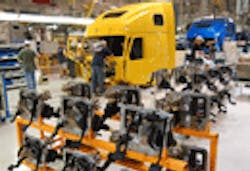Unease about U.S. economic growth and near-term freight volumes likely contributed to a significant drop in Class 8 orders in May. However, trucking experts continue to stress that Class 8 order intakes are yet extremely strong--- helping to fuel a truck-production backlog.
Indeed, all the tea leaves must be read. For example, according to ACT Research Co., North American Class 8 net orders fell to 23,300 in May, a nearly 40% decline from April. But Kenny Vieth, ACT president & senior analyst, stated that while orders in May fell well below April’s intake, they are still 77% above the order rate of May 2010.
“Despite falling nearly 40% from April, May was nevertheless the eighth consecutive month of strong Class 8 order activity,” he said. “It is worth nothing April’s level of order intake was unsustainable, so the pullback in May’s order volume was anticipated. [And] even though orders were less robust, the Class 8 backlog grew for a ninth straight month in May.”
Eric Starks, president of research firm FTR Associates, told Fleet Owner that while order numbers “remain in decent shape,” the decline is also a sign that “things are not as rosy as expected” in terms of U.S. economic growth and freight demand.
“We think if the economic recovery continues to slow, we’ll see orders slip below 20,000 per month,” he said. “There’s also a ‘production ceiling’ as well, meaning some manufacturers are all ‘pushed out’ in terms of build slots for the year.”
Currently, Starks said a “fair amount” of fourth-quarter order slots remain available, with a smaller amount of third quarter slots still open.
“Right now, we’re seeing a lot of fleets pushing for delivery of new trucks in the fourth quarter this year, which is a little odd, but the reason is they want to take the full depreciation on them,” he related.
That view is shared by Ron Huibers, Volvo Truck North America senior vp-- sales & marketing, who told Fleet Owner in a recent interview that “inflationary pressure” seems to be driving many trucking companies, large and small, to buy new equipment.
“Our customers are watching the cost of fuel and tires, among other goods, rising fast this year, and are faced with [operating] a fleet that’s far older than historical norms,” he said. “So, many fear that if they wait to buy trucks in 2012, they’ll cost a lot more.”
About the Author
Sean Kilcarr
Editor in Chief
Sean Kilcarr is a former longtime FleetOwner senior editor who wrote for the publication from 2000 to 2018. He served as editor-in-chief from 2017 to 2018.
